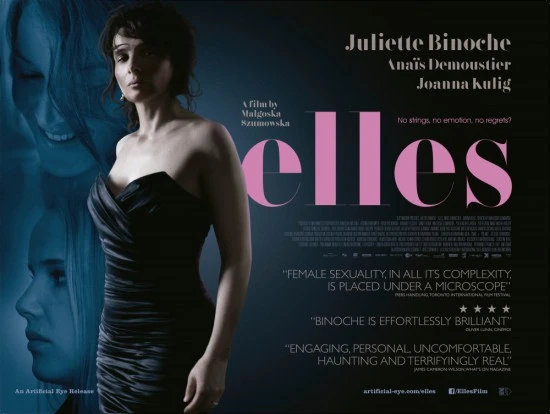The landscape of modern European cinema, few films dare to interrogate female sexuality and personal agency with the unflinching honesty that “Elles” (2011) offers. Directed by Malgorzata Szumowska and starring the ever-compelling Juliette Binoche, “Elles” is not simply an erotic drama, but a layered narrative exploring the dual lives of women.
Particularly the secret worlds they navigate behind their socially constructed roles. With a blend of subtlety and boldness, the film compels its audience to confront complex questions about feminism, freedom, intimacy, and power.
Plot Summary
The story centers on Anne (Juliette Binoche), a successful journalist for Elle magazine, who is conducting research for an article about female university students who engage in sex work. Through her interviews with two young women—Alicja (Joanna Kulig) and Charlotte (Anaïs Demoustier)—Anne is drawn into a world vastly different from her own comfortable, bourgeois existence. As she digs deeper, Anne begins to reflect on her own life, marriage, and desires, blurring the boundaries between observer and participant.
What begins as a professional endeavor soon becomes an intimate journey. Anne’s interactions with Alicja and Charlotte don’t just inform her article; they unravel her carefully curated domestic life and awaken a dormant curiosity about autonomy, pleasure, and rebellion.
Themes and Interpretation
Female Desire and Sexual Agency
At the heart of “Elles” lies a radical portrayal of female sexual agency. The film doesn’t depict Alicja and Charlotte as victims, nor does it frame their choices through a lens of moral panic. Instead, their narratives highlight the autonomy and negotiation involved in their work. They speak frankly about their experiences, balancing the emotional and transactional aspects of their lives.
Anne, by contrast, represents the traditional image of womanhood—educated, married, and motherly. Her discomfort and intrigue become a lens through which the audience examines their own assumptions. The film’s refusal to judge these young women or present a singular moral narrative makes it an essential feminist text.
Double Lives and Identity
“Elles” explores the compartmentalization of identity. Anne maintains her image as a journalist, wife, and mother while secretly immersing herself in a world that disrupts her understanding of freedom and satisfaction. Likewise, Alicja and Charlotte oscillate between their roles as students and sex workers, managing dual existences with a maturity that unsettles Anne.
This duality mirrors a broader societal phenomenon where women often suppress or mask parts of their identity to align with social expectations. The film exposes this conflict with brutal honesty.
Socioeconomic Commentary
Though set in Paris, “Elles” touches on universal socioeconomic realities. Alicja is an immigrant from Poland struggling to make ends meet, while Charlotte comes from a relatively comfortable background but seeks autonomy through her choices. Their reasons for turning to sex work are as complex as their personalities, underscoring the economic pressures that force many into commodifying intimacy.
Through these portraits, Szumowska critiques the hypocrisies of a society that judges sex workers yet benefits from their existence. The film never glamorizes or demonizes sex work—it simply humanizes it.
Performances and Direction
Juliette Binoche delivers a stunning performance as Anne. Her nuanced portrayal captures the conflicting emotions of curiosity, guilt, envy, and longing. Anne’s quiet unraveling is expressed not through melodrama but through restrained, poignant gestures—a glance, a pause, a broken silence.
Joanna Kulig as Alicja brings an electric energy to the screen. Her character is vivacious, unapologetic, and emotionally rich. Anaïs Demoustier’s Charlotte is more subdued but equally compelling, embodying the quiet resistance and introspection of a young woman navigating societal expectations.
Szumowska’s direction is both delicate and daring. The camera lingers but never objectifies. The intimate scenes are raw yet respectful, more concerned with emotion than titillation. Cinematographer Michał Englert frames the story with a muted palette that reflects Anne’s inner emotional dissonance.
Critical Reception
Upon its release, “Elles” received mixed reviews, particularly from American critics who often focused more on its erotic elements than its thematic depth. European audiences, however, largely appreciated its introspective approach. The film was praised for its honest performances, particularly Binoche’s, and its refusal to offer easy answers.
Critics also noted the film’s courage in addressing taboos without succumbing to exploitation. “Elles” doesn’t follow a traditional narrative arc, which some viewers found unsettling, but this structural choice serves to underline the film’s central thesis—that life, especially for women, rarely follows a neat trajectory.
Feminist Lens: Empowerment or Exploitation?
A recurring debate surrounding “Elles” is whether the film empowers or exploits its subjects. Some argue that the graphic content borders on sensationalism, potentially undermining its feminist message. Others maintain that its honesty is its strength.
What distinguishes “Elles” is its refusal to romanticize or condemn. The women are given full agency to speak, to contradict themselves, to express desire, confusion, and joy. In a cinematic landscape where women’s sexuality is often filtered through a male gaze, Szumowska’s lens feels refreshingly authentic.
Cinematic Techniques and Symbolism
Beyond dialogue, “Elles” communicates through powerful visual metaphors. Anne’s home, meticulously clean and well-lit, contrasts sharply with the dimly lit, chaotic spaces of her interviewees. These visual juxtapositions emphasize the divide between Anne’s constructed identity and the messy, vibrant lives of Alicja and Charlotte.
Scenes of Anne alone, especially in the kitchen or bathroom, are charged with silent introspection. The film uses mirrors, closed doors, and tight frames to reflect Anne’s growing sense of entrapment and self-scrutiny.
The Ending: A Mirror, Not a Message
Without giving away too much, it’s worth noting that “Elles” ends not with a dramatic climax but a quiet epiphany. Anne doesn’t experience a radical transformation, nor does she return entirely unchanged. The ambiguity of the ending reinforces the film’s commitment to realism.
Rather than prescribing a conclusion, “Elles” invites viewers to reflect. It holds up a mirror—not just to Anne, but to the audience—to question their own judgments, assumptions, and desires.
Legacy and Continued Relevance
More than a decade after its release, “Elles” remains a relevant and necessary film. In a world still grappling with questions around sex work, feminism, and female autonomy, it offers a narrative that is neither reductive nor prescriptive.
The rise of movements advocating for the decriminalization and destigmatization of sex work makes “Elles” all the more significant today. It challenges viewers to consider the stories behind the stereotypes and to listen more than they judge.
Conclusion
“Elles” (2011) is not a comfortable film, and that is precisely its power. It disrupts, provokes, and encourages introspection. Through the story of one woman’s journey into the hidden lives of others, it unearths universal truths about womanhood, freedom, and identity.
With mesmerizing performances and fearless direction, “Elles” stands as a bold and nuanced exploration of female desire and the multifaceted lives women lead


